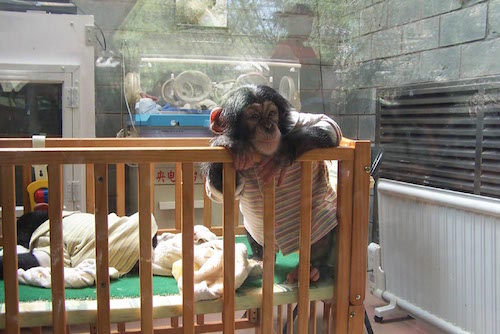Chimps Are Still Chimps, Not Persons

Good news on the human exceptionalism front: A New York trial judge has rejected the specious argument that chimpanzees are “persons” and should have human-type rights.
But that shouldn’t make us sanguine since the judge expressed undue sympathy for the cause. From the Science Insider story:
In today’s ruling, [NY Supreme Court Justice Barbara] Jaffe seems to express some sympathy for NhRP’s [Nonhuman Rights Project} arguments. She writes, for example, that something does not have to be a human being to be treated like a person in the eyes of the law, noting that corporations have been considered legal persons in some cases.
That’s true, but also false in this context. Whether or not one agrees they should be legal persons, corporations and other juridical entities are human associations. That’s a distinction with a huge difference.
But judges are not immune to being affected by society’s relativism, and Judge Jaffe spiced her decision with a reference to Supreme Court Justice Anthony Kennedy’s too loose use of language in decisions:
She also states that the concept of legal personhood continues to evolve: “Not very long ago, only Caucasian male, property-owning citizens were entitled to the full panoply of legal rights under the United States Constitution.”
And in her conclusion, she quotes Supreme Court Justice Anthony Kennedy’s words from a 2003 gay rights case: “Times can blind us to certain truths and later generations can see that laws once thought necessary and proper in fact serve only to oppress.”
Thank goodness, Jaffe recognized her obligations as a trial judge:
But ultimately, Jaffe writes that she is bound by legal precedent — specifically a decision made by a higher court last December in the earlier case involving the privately owned chimpanzee named Tommy. That court ruled that chimpanzees aren’t entitled to the same legal status as human beings, and that they don’t meet the legal definition of “person.”
“Even were I not bound by [that case],” Jaffe writes, “the issue of a chimpanzee’s right to invoke the writ of habeas corpus is best decided, if not by the Legislature, then by the Court of Appeals, given its role in setting state policy.”
More suits to declare animals “persons” are planned:
[NhRP President Steven] Wise says his group is filing an immediate appeal as well as focusing on new cases. “We are deep into planning our next lawsuit, which will be on behalf of elephants in another state,” he writes. “We expect to file it this year.”
This threat should be taken very seriously– and combated vigorously in court and in legislatures
All it takes is one judge wanting to go down in history. Indeed, an Argentinean judge granted a writ of habeas corpus to an orangutan.
